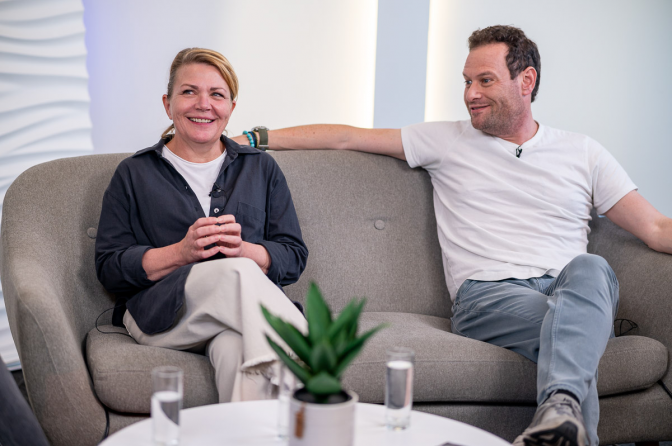
Photo by Ivan Stanislavskyi/Tvoe Misto
You, Deborah, have been in Ukraine with the Ukrainian government. Justin has experience with the American government. What was your reason for specifically focusing on tech: you had a good experience with UkraineInvest and were in the leading positions at UkraineInvest, at Ukrainian Startup Fund, and TechUkraine. Does it mean that you see the biggest potential now in Ukrainian tech when we speak about startups specifically?
Deborah Fairlamb (D): My background is more in the private sector. I started my career in the private sector in investments in business development. Governments play a role in certain spaces, but to my mind, it is the private sector where growth comes from. I had spent time consulting for the government of Ukraine, and there were very specific projects at UkraineInvest, very much aimed at bringing investments into the country. The Ukrainian Startup Fund was something new. The idea had come at the time Prime Minister Groysman had made a trip to Israel. He said that the Israeli government invested in the Israeli startup ecosystem 20 years ago. He wanted to have an investment vehicle that the government could use to jumpstart the ecosystem. That’s one of the origins of this idea. It was narrow enough in terms of what they were trying to do. It was small grants given out to carefully vetted companies or startups that were being judged by a jury. It was during this time, particularly with that project, that I became aware of the broader spectrum of the ecosystem that was out there. Quite frankly, there is such a dynamic energy in the tech ecosystem. And it is not only young people driving it, there are folks in their 40s and their 50s who would come out of the more science, engineering, and technological background of the Soviet Union who have led the way in terms of this. So it’s a great balance of knowledge, useful energy, and a desire to create their future through companies that they are building.
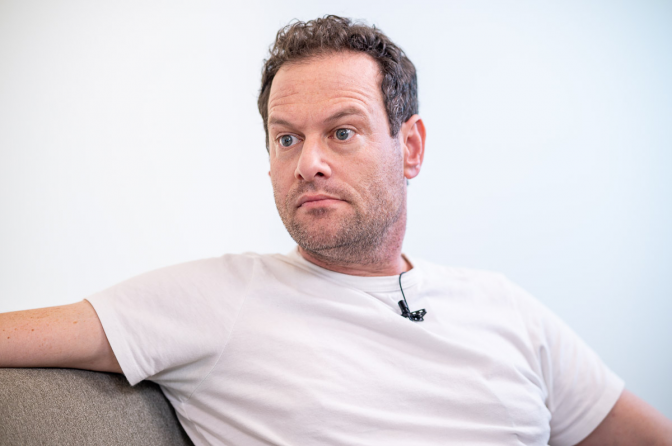
And now, Justin, you had different experiences, you worked a lot in the private sector, and you came to tech, you founded Nisos in 2014, right? Why did you also decide to focus on Ukraine?
Justin Zeefe (J): I love the question because I love the answer, to be honest. I started, as you mentioned, Nisos in 2014. Our objective is to help large enterprises and any clients who need to defend themselves against groups, generally not from a specific country, but groups nonetheless, who are seeking to cause damage to a reputation or a financial position. We found ourselves working a lot in the election disinformation space. Over the years, we’ve been very fortunate to solve problems like who are the groups in country X that are working together to spread disinformation across the world. I’m a lazy person inherently by nature. And if I don’t have something to stand up and fight for the thing that matters, it’s hard for me to get motivated.
I knew nothing about Ukraine before I came here the first time. My good friend, Edward Marshall, who’s a great champion of Ukraine, convinced me to come and volunteer in April of last year. I showed up for three weeks to drive medical supplies around from wherever they had been collected from donations overseas and drive them to the field hospitals or clinics a bit outside of Kyiv. It was Help Ukraine 22, a great organization. I saw something that provoked a lot of different emotions in me, both towards Ukraine, the world, and my own country. I am still a firm believer in the concept of American exceptionalism, which is different from the idea that the United States is better than other countries. It’s that the United States has a unique position and opportunity, and therefore, in my opinion, responsibility to support the world and democracies when and where we can.
I also served during my time in government, I served full deployments in both Iraq and Afghanistan. So I’ve spent time on the ground in conflict zones, and I didn’t realize until I came here that you could be in a conflict zone and still care about self-determination and independence and freedom in a way that was more than, we just want the bullets to stop or we just want the shells to stop, which there’s nothing wrong with wanting the violence to stop, but you can go further. You can decide that collectively you and your society can decide how your future looks, what kind of rights you have, and what you protect for others. I never saw that in those places. I didn’t see that desire, that drive among the people.
And everywhere I went, it felt like what I imagined the United States felt like a week after Pearl Harbor. It was fierce patriotism without the jingoistic element. It was just – we’re together in this, we are not going to give up, and if you’ll support us, we will take it and we need it. And I felt it.
I do a lot of things based on how they make me feel. And I felt like this was something important.
I met several tech entrepreneurs when I was in Kyiv and it was clear to me there was something there. I went back home and I spent probably eight months making phone calls and having conversations with people in the ecosystem and trying to provide value just to help. I met people who said if I had a contact at this organization, I could do so much more or I could help or they could use my product. From Nisos, we only sell to large enterprise organizations. So my ability to call somebody at a major Fortune 500 or a publicly traded company and to leverage the trust that I’ve built with those people over time, having worked with them through Nisos, meant that I could put a deck in front of them or I could put a connection in front of them and say, hey, this organization needs some support. They don’t need a donation. They don’t need a handout. They just need a conversation. They can prove themselves. They just need that introduction. And so I started doing a lot of that and I was like, I knew I wanted to get into venture investing, and that all came together.
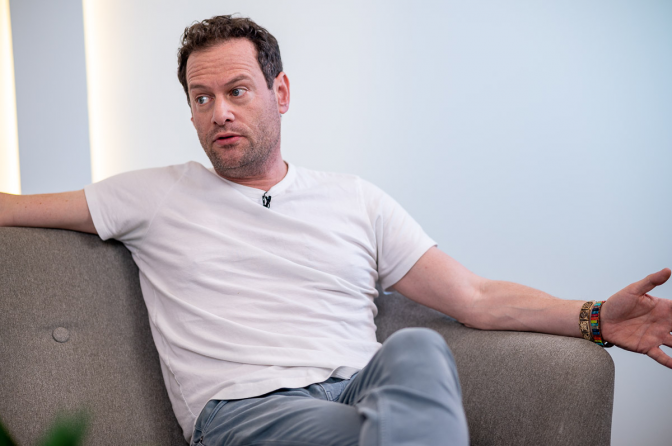
So you both have a big mission here, but also you have, I think, big plans for what your venture capital firm will be doing here. Except for this big mission to help Ukraine, where do you see the biggest perspectives, and what are you going to do as a venture capital firm?
J: I have many different feelings on the subject and some of them conflict with others because I worry, I try to be very, very transparent in how I feel in most conversations, whenever I can. The more economic relationships we develop between our countries, both the United States and Ukraine and other democratic countries around the world, the less likely it is that there will be conflict. And Russia knows this. It’s probably not a coincidence that when they invaded Crimea in 2014, that the Ukrainian government was in mid to late-stage conversations with Shell and a few other large multinational oil companies to develop land in the Black Sea because Russia knew once an American oil company or a Dutch oil company set up a shop, it’d be much more difficult to invade because other countries are going to have a quiet conversation with them about the problems that would cause. So they decided to harm these economic opportunities for Ukraine.
I think most people in the United States don’t understand the reason we should be supporting Ukraine if you can’t wrap your head around the need to help another democracy. We sold this to the American people and this is what we were doing in Iraq. We sold this that this is what we’re doing in Afghanistan. We did that in neither place, and I’m partially to blame for that. And it needs to be a different story here. This is not Darfur, this is not Somalia, this is not Kosovo. This is a very different situation. It’s a democracy that is under attack in Europe, and we need to build those economic bridges and I see a tremendous amount of opportunity to do very well as an investor here by doing good.
Do you agree that it might be a new tactic or strategy of Russians that they started hitting many manufacturers, many companies, and warehouses of the companies founded both by Ukrainian and foreign investors? Is it something that they may be trying to hit this autumn and winter?
J: I certainly have no idea what’s in the Russians’ heads. Would they seek to damage the interest and opportunity for foreign direct investment into Ukraine by sending the message to prospective investors that it’s not safe to do that? Yes, that’s certainly something they could do. If we were investing in motorcycle factories, that might be something I’m a little bit concerned about. I don’t want to see Ukrainian factories hit and the workers inside of them getting killed, but from a risk perspective as an investor, I’m less concerned.
D: To your point about things being in the cloud, the biggest vulnerability then becomes people. The issues with electricity, satellite connection, and things like that, again, were addressed quite quickly. So from the outside investing in Ukrainian tech perspective, the risks have largely been mitigated in that context. I would agree that investing in technology right now is a much lower risk than most people may perceive it to be from the outside.
J: There’s always a risk. Frankly, I think every professional exercise I’ve undertaken has had a considerable amount of risk associated with it personally or professionally. And it’s about understanding your risks and mitigating your risks and understanding the benefit, the risk versus gain calculation. And here is the gain, it’s the reason why we call our venture Green Flags, because when I look at Ukraine I see the opportunities.
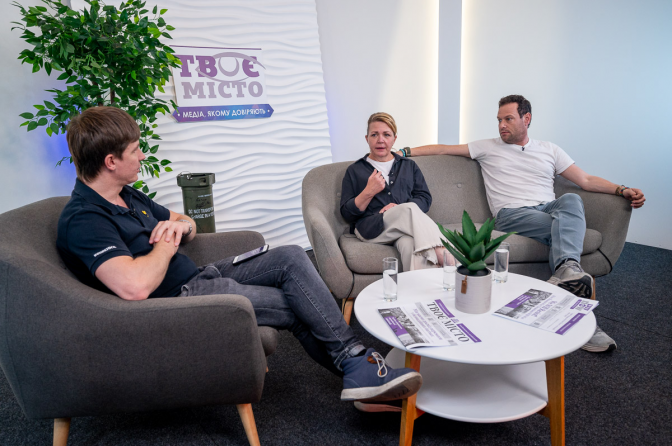
Can you tell more details about all these advantages, gains, and opportunities that you see here? We often hear in international media outlets that foreign companies will build a plan for investing in Ukraine only after the victory, but no one knows when the victory will come, though, of course, it will come. What would you tell those people who are still thinking, should they go and help beyond just humanitarian things?
J: I want to challenge the words that you used in your question because you described victory as something that’s just going to show up and knock on the door. It’s something that you take. It’s something that you make happen. You’ll be victorious because you choose to be and because you put your back into it and you fight.
In the US, in the media, if it leads, it bleeds, right? It is the old saying. What do you see on the news? You see a bombed-out building. It plays into the storyline of a broken Eastern Europe that was cut off from the Soviet empire, but it’s still sort of hanging. It never became a fully-fledged thing. I lived in Germany for five years and spent a lot of time in Eastern Europe, but never made it to Ukraine. Those places are very different. Ukraine is not Bulgaria, Ukraine is not Romania, it’s very different, and it’s far more aligned culturally and in every other important, measurable way to the United States than anywhere else I’ve ever been.
You have an abundance of things that would make the Russians want to come and take them. Nobody is taking seriously the argument that they were here to de-Nazify the country. So why are they here? Is it because Putin is obsessed with reconstituting the Soviet empire? Maybe. Is it because this is where all of the resources are and the people? And because it was the last opportunity they had to come try and do this not knowing that they missed their window, right? The Russians are never going to control this city or any city in this country. They don’t have the manpower, much less the firepower, to come and take something like Ukraine. It’s not a realistic scenario where there’s a victory for Russia. Still, there is a scenario where it’s just dragged out and damages the ecosystem and economic opportunities here, and we want to protect those because they’re worth a lot.
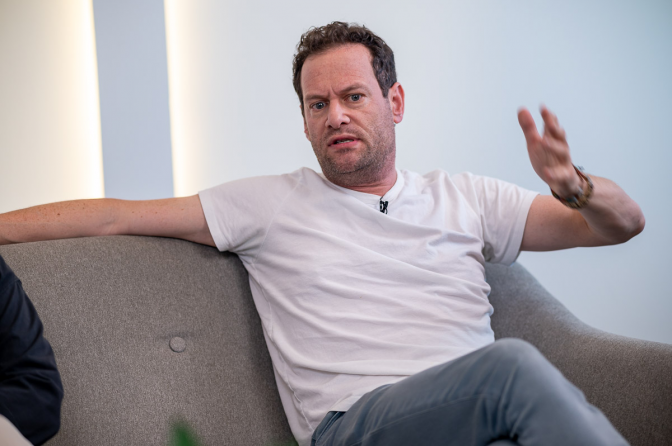
D: I’ve been here for a number of years, I have, again, slightly different context and views, and I have never doubted that Ukraine was on its way to being an extraordinary, you know, economic powerhouse. In some ways, it was 2014 when the growth in this country began to hyperaccelerate. And I’ll just give you a crazy example. When Ukrainians were easily able to start traveling to Europe, and I’m not kidding you, I could see within about a six-month period how they were coming back and they picked up new ideas. I saw new coffee shops popping up. I saw a new boutique shopping popping up. All of a sudden I realized that a door had been opened for the Ukrainians. There were so many fantastic restaurants that started popping up all over the place. And so all that needed to happen and with this particular piece, just the ability to travel. This is an extraordinarily entrepreneurial country. Once people have an idea, they figure out how to make it work here.
I think Ukrainians often doubted themselves much more than I ever doubted them.
So in the context of the why now versus the later, the first and foremost thing is that there’s just so much going on right now. There is a tremendous amount of energy. There is such a passion and a will to keep moving forward, you know, despite what’s happening out in the West. Those who are not on the front feel a really strong moral, cultural, social, and personal imperative to be doing something in the non-battle zones. A lot of that is being translated into the economic sector.
It’s so hard from the outside to see what’s happening if you are not there. We had brought a number of Western speakers into Ukraine to speak at IT Arena. We had just facilitated some of the introductions. All of them said they had no idea what it would be like and they have all been extremely moved by the people they’ve met, the stories they’ve heard, and the normal, lovely city.
Thank you for that. That means that your main advice is to come here and just see and feel it.
D: It’s an incredibly, it’s such a different way of perceiving anything. And it’s true for any country. You can look up pictures online and see them, but there is something really unique about Ukraine. I think Americans sometimes lump the whole Eastern European bloc together, but Ukraine is so extraordinarily different for a whole host of reasons than any of the surrounding countries.
When people come here and see the architecture, talk to people on the street, engage in conversations with people in restaurants, taste the food, and see what’s happening here it’s like their eyes are opened. I have seen this going as far back as when we were working with UkraineInvest. One of the big things we’ve tried to do was just get people to come to the country because you almost don’t have to sell it once people are here. It’s so hard to articulate from far, particularly when you have screaming headlines of all the horrific things that the Russians are doing. But when you’re here, you understand life is carrying on in so many different ways.
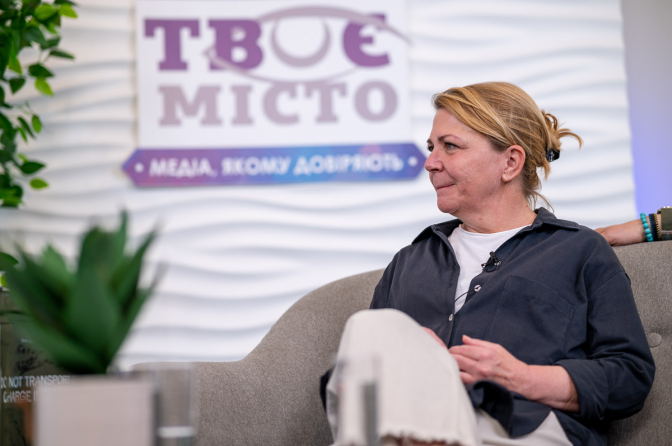
J: I came for three weeks last spring. I came back again with this thesis in mind a month and a half ago. If you come here and you don’t immediately or near immediately recognize the entrepreneurial spirit in the people and specifically in the founders who are putting companies together and trying to solve really hard problems, then you don’t know how to recognize an entrepreneurial real spirit. It’s extremely strong here and I recognize it because even putting an investor hat aside as a founder and somebody who came up through the startup ecosystem with next to no connections at the beginning. Here, people have a sense of mission, duty, and purpose, and maybe I’m just biased because those are the things that I look for when I’m assessing a person’s character in many ways.
Speaking about teams, businesses need not only great founders, but also good employees. Do you remember that there were different conversations even in Lviv IT Arena at your panel? We will have more people with disabilities after the war, we now have five to seven million refugees who fled Ukraine. Do you see this as a challenge because companies that are aimed at growing of course need more and more people? Taras Kytsmey of SoftServe says that those people who are now abroad will come back and bring much more competencies and they will work even better for Ukraine. What is your thinking about it and do you see this as a challenge?
D: I think there has to be a solution and there is a moral obligation in terms of helping people who are coming back from the frontline to find ways to continue with their lives, particularly if they’ve been injured and are disabled. If they had been in farming and they can’t do it anymore, there has to be a national way to address this issue.
There are a lot of people who are talking about technology, trying to find ways for people who are coming back from the frontline to get involved in technology if they have not already been. Cybersecurity is one of the areas that are specifically trying to get people to focus on because there are not enough people in cybersecurity around the world. The thought is if you can train enough people in cybersecurity here, they can do work remotely, and it would be a bridge between a problem and a solution, and an opportunity.
As to the number of people outside of the country, I know there’s a lot of angst and hand-wringing about whether people are going to come back or not. At the end of the day, everybody is going to make their own decisions. It’s a lot of women and children who have left. They probably are not going to come back for the safety of children, until there is safety and security. There’s very little that a government can do to make people come back. They will come back if there are ground basics that they need, so I think that it may be better to focus on making Ukraine a place that people want to return to.
The economic challenges with building teams, quite frankly, that’s not something I’m worried about. first of all, it is extremely important for the success of a startup to have a good and balanced team You want your hipster, hacker, hustler. Any good company startup, particularly needs a balance of skill sets. It’s rarely one person who can do two of those, let alone three, but there is an enormous talent pool that is in Ukraine. It is dispersed right now, there are a lot of people who have either left or are on the frontline. So it may be not quite as easy to fill a position as it was before the war, but does that mean it’s going to be the issue forever? I’m not worried about that at all. You also said when people would come back, they would bring different skills and different experiences. I think that that’s a brilliant thing.
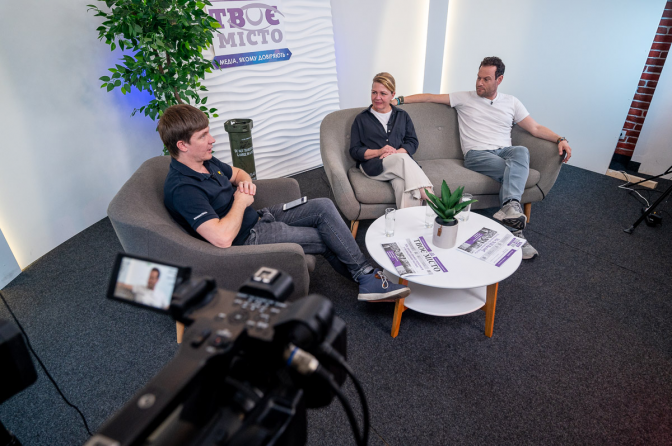
J: Can I answer that question as well? When I first was doing the research, I wrote down what was it that I hoped to accomplish. And then I wrote down all of the reasons why I wouldn’t want to do this, or why this would not be a smart decision, personally or professionally. And those were the red flags, right? And then I went through each of them over time to understand them and they flipped most of them to green. Having made plenty of mistakes in the past, I wanted to make sure to avoid as many of them as I could.
Looking at talent flight was certainly one of those. People don’t understand, certainly in the United States, that Ukraine during the era of the Soviet Union was the intellectual center of the entire empire. There are so many universities in this country that are kicking out, I think it’s like 50,000 new highly qualified personnel in information technology every year. If some people never come back, you will have replaced them in like five, six, or 10 years. You will, by the way, have passed Israel in raw numbers of highly qualified IT personnel in six years or something like that, from when I was looking at the numbers. So, I’m less concerned about flight.
There are enough people here who have stayed, and enough obvious indicators to me that the country is going to do nothing but grow and evolve. You would be okay with that diaspora knowing that they’re still in their hearts Ukrainians and they’d still care very much for the country and do what they can to support it. It’s not like they left because they don’t want anything to do with this place.
Can you share in more detail your plan for the near future for Green Flag Ventures in Ukraine?
J: Green Flag Ventures is a venture capital firm based in both Los Angeles and Kyiv where Deborah lives. We invest in early-stage Ukrainian tech companies, specifically targeting dual-use capabilities that have commercial and military applications, cybersecurity, AI and ML, and FinTech. I’d like us to also include climate and green energy when we find the right companies, because how can you not? it’s the biggest problem facing the Earth. You don’t have to like it for it to be true. So I would like to make meaningful steps towards that. So we intend to invest in the order of 12 to 15 or 20 Ukrainian businesses over the next three to five years and help them grow.
One of the things that is one of the several green flags that make us believe that we’re best suited to do this and that the opportunity is there is my experience or our collective experience in U.S. government selling into the large commercial industry in the United States, my relationship with the tech ecosystem and the fact that as a founder and somebody who has supported the ecosystem for years, there are a lot of folks out there who are willing to help and who are looking for innovative solutions to their problems. There’s been more than a 50% drop in foreign direct investment into Ukraine since the war started, but the tech ecosystem has grown more than 24%, which, by the way, is not only impressive by itself, but you also have to consider it was growing 30% year over year for the seven or eight years before that. It needs access to the markets. These founders need help reaching buyers and they need help with their pitches, but you can teach somebody how to pitch their product. You can’t teach somebody how to be innovative.
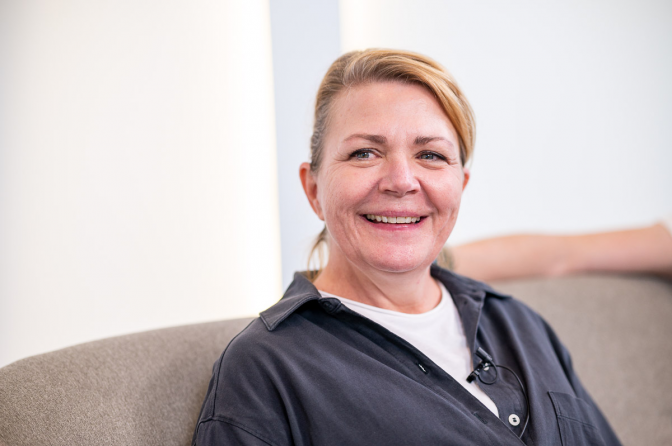
And Deborah’s experience with the Ukraine startup ecosystem might be also quite helpful here as I understand.
D: Justin and I balance each other very well in terms of the different skills and the different bases of contacts and things that we have. Over y the last six years, specifically within the ecosystem, I’ve got a pretty good understanding of figuring out who’s out there, looking for sort of the very specific opportunities that we’re going to be looking for, and being able to do the quick evaluation, quick understanding, and then running it through kind of the normal process of evaluating a startup just like anybody would.
J: I’ve been fortunate, you know, as a founder to have very supportive investors and they help in ways that they promised that they would. Many founders out there take capital from an investor, it’s just money. It’s dumb money. They don’t provide any support and that’s not what we want to do. So we, it’s not just the capital, it’s the capital plus all the value that we’re bringing and that’s why we’re so confident we’re going to succeed here.
I think that’s the perfect ending to our conversation and I’m so thankful for you for this extremely positive view in this tough time. I think this is inspiring not only for international audiences but also for Ukrainians who sometimes see so many bad things happening, and thanks to this helicopter view we can see a much broader future.
The interview was conducted by Taras Yatsenko
Photos by Ivan Stanislavskyi/ Tvoe Misto
Follow us on Facebook and Instagram. Lviv Now is an English-language website for Lviv, Ukraine’s «tech-friendly cultural hub». It is produced by Tvoe Misto («Your City») media hub, which also hosts regular problem-solving public forums to benefit the city and its people.


